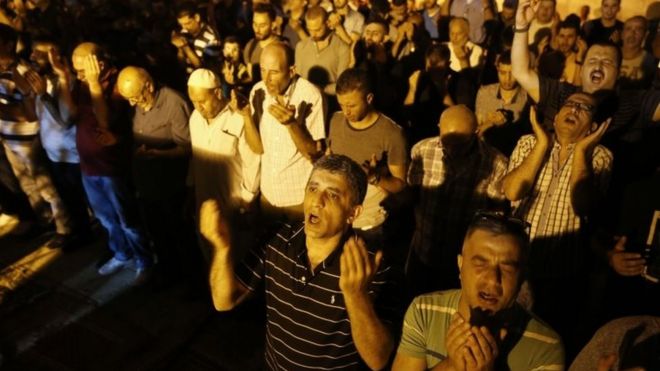 AFP
AFP
Palestinian leader Mahmoud Abbas says he will maintain a freeze on contact with Israel, despite the removal of metal detectors at a sensitive religious site in East Jerusalem.
The installation led to deadly clashes and uproar from Palestinians who saw it as an Israeli attempt to assert control over the site.
Israel said it was necessary to prevent weapons being smuggled in.
It says it now has plans to replace them with less obtrusive surveillance.
Both sides are under pressure from the international community to resolve the row over the holy site, known to Jews as the Temple Mount and Muslims as Haram al-Sharif.
The UN's Middle East envoy has called for tensions to be eased ahead of Friday prayers - which tend to draw thousands of worshippers - or they risk spreading "well beyond" the ancient city.
Why were the measures introduced?
Security measures changed after two Israeli policemen were killed by Israeli-Arab gunmen at the hilltop site on 14 July.
After a temporary two-day closure, the site was reopened with new metal detectors at the entrances, sparking a boycott of the compound with many Palestinians praying in the streets outside the Old City instead.
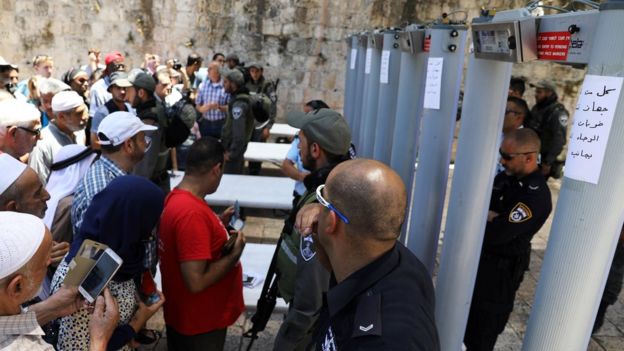 REUTERS
REUTERS
In the days that followed, four Palestinians were killed in clashes with Israeli security forces in East Jerusalem and the occupied West Bank, while three Israeli civilians were stabbed to death by a Palestinian who said he was avenging the new security measures.
What was the response to the latest changes?
Amid international concern over the rising tensions, the office of the Israeli prime minister said on Tuesday that it would replace the detectors with "advanced technologies and other means".
New measures would be put in place over the next six months, with extra police deployed until then, it added.
According to Reuters news agency, crews were seen removing the detectors and recently-installed cameras early on Tuesday.
But President Abbas and the senior Muslim cleric who oversees the compound have dismissed the changes, calling for measures to go back to what they were prior to the attack more than ten days ago.
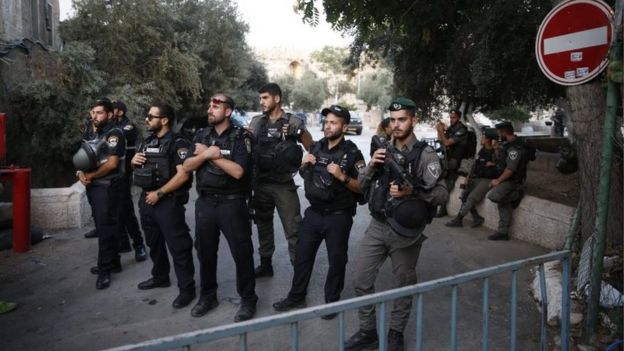 AFP
AFP
The Palestinian leader said this was necessary "so things can go back to normal in Jerusalem and we can resume our work regarding bilateral relations".
He said a government freeze on co-ordination with Israel, including on security issues, over the controversial security measures would remain in place.
The Waqf religious body that runs the site also said Muslim worshippers would continue their boycott of the sacred compound and pray instead on the streets outside.
Analysis: Facing pressure
Tom Bateman, BBC Jerusalem correspondent
The crisis at this revered site was about much more than the existence of the airport-style gates and electronics of the metal detectors themselves.
For Palestinians, their installation symbolised what they saw as an attempt by Israel to assert further control over the site of their holy shrine in occupied East Jerusalem - the mosque that also acts as a powerful symbol of their national aspiration.
For Israel's government, the move represented the need to secure what one minister called "the most sensitive location on Earth" - Judaism's most holy place - after the murder of two Israeli police officers close by.
Leaders will have felt pressure from within their own constituencies not to be seen to back down.
International calls for a solution have added to the pressure on both sides - which were dealing with complex internal politics too - but it is still not clear this crisis has been entirely resolved.
What's behind the controversy?
The Temple Mount/Haram al-Sharif in Jerusalem's Old City is sacred to both Jews and Muslims. Jews revere it as the location of two Biblical Temples and holiest site in Judaism. It is also the al-Aqsa mosque compound, the third holiest site in Islam.
The area, in East Jerusalem, has been under Israeli occupation since the 1967 Middle East war.
The site is hugely politically sensitive and has been subject to a delicate set of arrangements - commonly referred to as the "status quo" - governing access, security and administration, for the past 50 years.
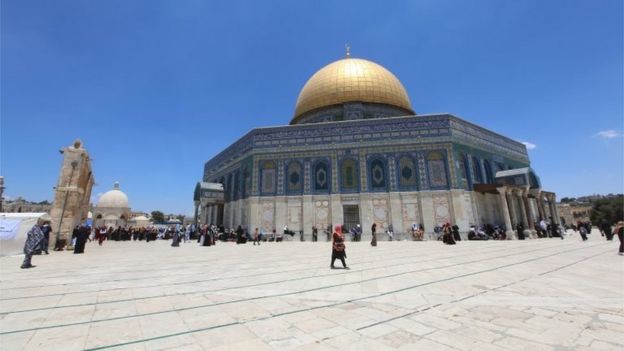 EPA
EPA
Under the arrangement, Israel is responsible for security and a Jordanian-funded religious trust, or Waqf, looks after the day-to-day running of the site.
Palestinians said the placing of the metal detectors upset the status quo, which Israel has repeatedly pledged to maintain. Israel said Palestinians were using the issue as a pretext to spread hostility against the Jewish state.
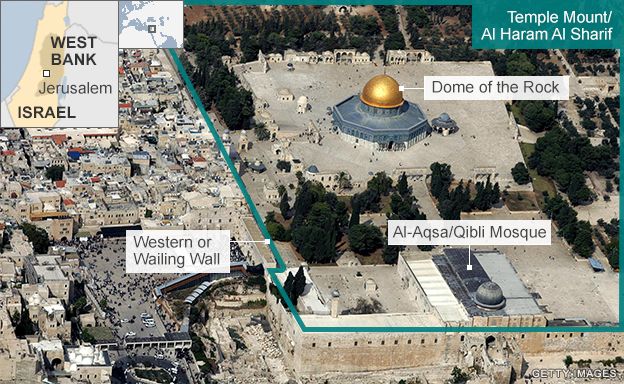
No comments:
Post a Comment